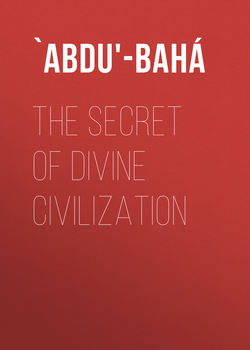The Secret of Divine Civilization

Реклама. ООО «ЛитРес», ИНН: 7719571260.
Оглавление
`Abdu'-Bahá. The Secret of Divine Civilization
[Pages 1–20]
[Pages 21–40]
[Pages 41–60]
[Pages 61–80]
[Pages 81–100]
[Pages 101–116]
Отрывок из книги
of government to new heights of perfection. They shine in the learned world like lamps of knowledge; their thinking, their attitudes and their acts demonstrate their patriotism and their concern for the country’s advancement. Content with a modest stipend, they consecrate their days and nights to the execution of important duties and the devising of methods to insure the progress of the people. Through the effectiveness of their wise counsel, the soundness of their judgment, they have ever caused their government to become an example to be followed by all the governments of the world. They have made their capital city a focal center of great world undertakings, they have won distinction, attaining a supreme degree of personal eminence, and reaching the loftiest heights of repute and character.
Again, there are those famed and accomplished men of learning, possessed of praiseworthy qualities and vast erudition, who lay hold on the strong handle of the fear of God and keep to the ways of salvation. In the mirror of their minds the forms of transcendent realities are reflected, and the lamp of their inner vision derives its light from the sun of universal knowledge. They are busy by night and by day with meticulous research into such sciences as are profitable to mankind, and they devote themselves to the training of students of capacity. It is certain that to their discerning taste, the proffered treasures of kings would not compare with a single drop of the waters of knowledge, and mountains of gold and silver could not outweigh the successful solution of a difficult problem. To them, the delights that lie outside their work are only toys for children, and the cumbersome load of unnecessary possessions is only good for the ignorant and base. Content, like the birds, they give thanks for a handful of seeds, and the song of their wisdom dazzles the minds of the world’s most wise.
.....
It should not be imagined that the writer’s earlier remarks constitute a denunciation of wealth or a commendation of poverty. Wealth is praiseworthy in the highest degree, if it is acquired by an individual’s own efforts and the grace of God, in commerce, agriculture, art and industry, and if it be expended for philanthropic purposes. Above all, if a judicious and resourceful individual should initiate measures which would universally enrich the masses of the people, there could be no undertaking greater than this, and it would rank in the sight of God as the supreme achievement, for such a benefactor would supply the needs and insure the comfort and well-being of a great multitude. Wealth is most commendable, provided the entire population is wealthy. If, however, a few have inordinate riches while the rest are impoverished, and no fruit or benefit accrues from that wealth, then it is only a liability to its possessor. If, on the other hand, it is expended for the promotion of knowledge, the founding of elementary and other schools, the encouragement of art and industry, the training of orphans and the poor—in brief, if it is dedicated to the welfare of society—its possessor will stand out before God and man as the most excellent of all who live on earth and will be accounted as one of the people of paradise.
As to those who maintain that the inauguration of reforms and the setting up of powerful institutions would in reality be at variance with the good pleasure of God and would contravene the laws of the Divine Law-Giver and run counter to basic religious principles and to the ways of the Prophet—let them consider how this could be the case. Would such reforms contravene the religious law because they would be acquired from foreigners and would therefore cause us to be as they are, since “He who imitates a people is one of them”? In the first place these matters relate to the temporal and material apparatus of civilization, the implements of science, the adjuncts of progress in the professions and the arts, and the orderly conduct of government. They have nothing whatever to do with the problems of the spirit and the complex realities of religious doctrine. If it be objected that even where material affairs are concerned foreign importations are inadmissible, such an argument would only establish the ignorance and absurdity of its proponents. Have they forgotten the celebrated hadíth (Holy Tradition): “Seek after knowledge, even unto China”? It is certain that the people of China were, in the sight of God, among the most rejected of men, because they worshiped idols and were unmindful of the omniscient Lord. The Europeans are at least “Peoples of the Book,” and believers in God and specifically referred to in the sacred verse, “Thou shalt certainly find those to be nearest in affection to the believers, who say, ‘We are Christians.’”13 It is therefore quite permissible and indeed more appropriate to acquire knowledge from Christian countries. How could seeking after knowledge among the heathen be acceptable to God, and seeking it among the People of the Book be repugnant to Him?
.....